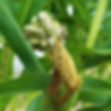

About the Farm
Hinata Farms is a Japanese Heritage farm located in Chicago, IL that focuses on growing Asian varieties of vegetables and herbs for the local community. In the Japanese language, "Hinata" means "a sunny place". When written in kanji "日向" means "toward the sun".

About the Farmer
Rachel Nami Kimura is a proud Japanese-American raised in the Edgewater and Rogers Park neighborhoods of Chicago. Her love for cooking and eating started as a young child where she was always helping in the kitchen and always the last to leave the dinner table. One of her fondest traditions is cooking Osechi, traditional Japanese New Year's Day meals.
Rachel's interest in growing was sparked in 2009 when she got involved as a volunteer to help transform an empty city lot into the Altgeld-Sawyer Corner Farm. Since then, through numerous classes, independent study, volunteering, and experimenting with plants both indoors and in backyards, she got her fix for growing. After about ten years of growing as a hobby, she decided that it was time to pursue growing as a career. In 2019 she completed an urban farming apprenticeship program where she worked on the McCormick Place Rooftop Farm and received a Certificate in Sustainable Urban Agriculture through the Chicago Botanic Garden and a Certificate in Sustainable Urban Horticulture through the City Colleges of Chicago.
Previously, Rachel has worked five years as an educator and five years as a paralegal. Her educational background is in History and French Language. In her free time she likes to cook (especially gyoza), go dancing, eat delicious food, and spend time with her family.

Farming Practices
You may notice that our plot may look a bit different from other more traditional production farms. This is because Hinata Farms is heavily influenced by the principles of Japanese natural farming. It's an approach in which we work WITH nature to grow. Its major principles include:
1. Human cultivation of soil, plowing or tilling are unnecessary, as is the use of powered machines
2. Prepared fertilizers are unnecessary
3. Weeding, either by cultivation or by herbicides, is unnecessary; instead, only minimal weed suppression with minimal disturbance should be used
4. Applications of pesticides or herbicides are unnecessary.
Although we face some major limitations to employing some of these practices (small land, temporary lease, raised bed separated from contaminated urban native soil), we try to incorporate as much of these principles as possible. It may be a slow process of careful observation and trial and error, but I truly believe it will be worth the effort, especially from an ecological perspective.
If you are interested in learning more about natural farming, I highly recommend Masanobu Fukuoka's book, One Straw Revolution. He is considered the Father of Japanese Natural Farming and his words have deeply shifted my views on growing.

Volunteer and Job Opportunities
Volunteer Opportunities: At this time, we are at capacity with volunteers and are not looking to take on new volunteers.
Job Opportunities: At this time, we are not looking to hire employees.
If you are open to job and volunteer opportunities with other organizations in the Chicago area, Advocates for Urban Agriculture (AUA) is a great place to look!